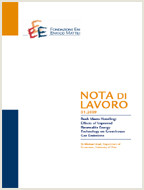Free-Riding on Tax Credits for Home Insulation in France: an Econometric Assessment Using Panel Data

12.03.2014
Marie-Laure Nauleau
Q48, R22, D12
Energy Conservation, Residential Sector, Thermal Insulation, Tax Credit, Free-Riding, Difference Estimation, Panel Data, France
Energy: Resources and Markets
Giuseppe Sammarco
This econometric study assesses the efficiency of the income tax credit system implemented in France in 2005 on households’ retrofitting investment decisions, focusing on insulation measures. A logit model with random individual effects is estimated using an unbalanced panel of 23,879 households surveyed over the period 2002-2011. An estimation in difference is performed to identify the impact of the policy. The tax credit had no significant effect during the first two years, suggesting a latency period related to inertia in households’ investment decisions, possibly due to the complexity of the tax credit scheme. The tax credit had an increasing, significant positive effect from 2007 to 2010, before slightly decreasing in 2011. This is in line with changes in the tax credit rates, suggesting a correlation with the level of subsidy. Defined as the situation in which the subsidized household would have invested even in the absence of the subsidy, free-riding progressively decreased over the period and was lower for insulation of opaque surfaces (roofs, walls, etc.) than for insulation of windows. The estimated average proportion of free-riders varies between 40% and 85% after 2006. Finally, we assess the potential bias caused by time-varying unobservable variables and conclude that our estimates of the impacts of the policy are conservative.
***
Suggested citation: Nauleau, M.L., (2014), ‘Free-Riding in Tax Credits For Home Insulation in France: An Econometric Assessment Using Panel Data’, Nota di Lavoro 26.2014, Milan, Italy: Fondazione Eni Enrico Mattei.
